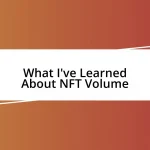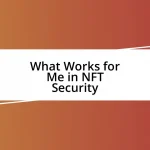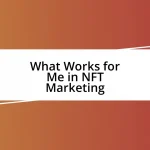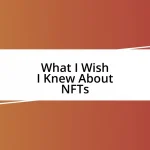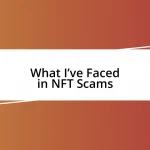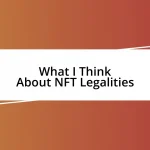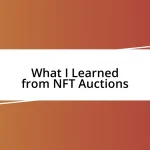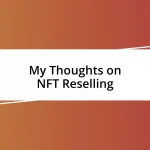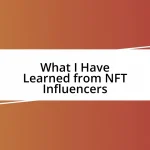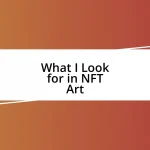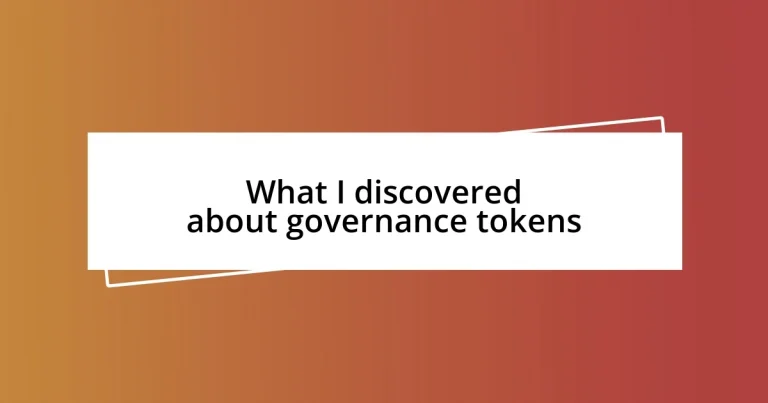Key takeaways:
- Governance tokens empower community participation by providing voting rights on key decisions, creating a sense of ownership and engagement.
- While governance tokens foster democratic processes, challenges like voter apathy and the dominance of large holders (whales) can undermine collective decision-making.
- The future of governance tokens could enhance transparency and engagement through innovative mechanisms, such as quadratic voting and automated governance systems.
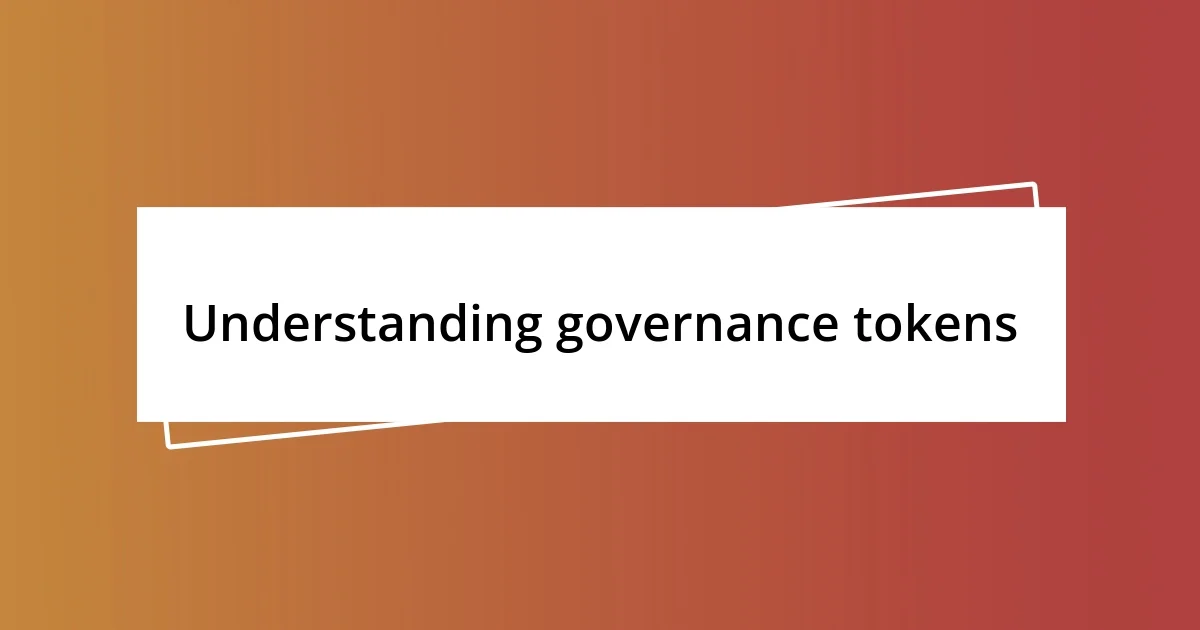
Understanding governance tokens
Governance tokens are fascinating tools that empower holders to influence the direction of a decentralized project. I remember the first time I participated in a governance vote; it felt invigorating to know I had a say in crucial decisions. Have you ever considered how your voice could shape the future of a community you’re passionate about?
These tokens often grant users voting rights on proposals such as protocol upgrades or treasury fund allocations. It’s intriguing to me how these mechanisms create a sense of ownership among participants, almost like being part of a cooperative rather than just a customer. I sometimes wonder how many people realize the weight of their vote and whether they truly engage with the issues at hand.
One of the standout features of governance tokens is that they can foster a deeper connection between the community and the project. I’ve witnessed firsthand how enthusiastic members rally to discuss and strategize around upcoming votes. This collective engagement can turn abstract governance into a vibrant dialogue, making the entire process feel alive and responsive. How often do we get the chance to help guide a project’s future right from our own screens?
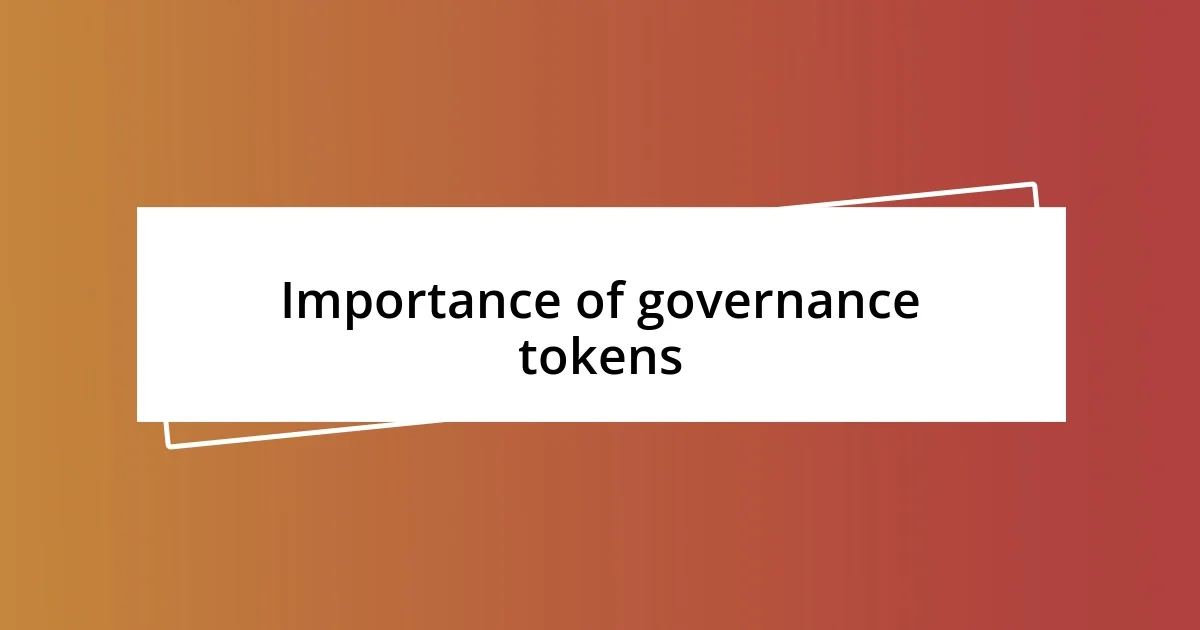
Importance of governance tokens
Governance tokens are essential for fostering a participatory culture within decentralized projects. I vividly recall a moment when I cast my vote on a significant proposal; it felt like I was standing shoulder to shoulder with other community members, all of us weighing in on something that mattered deeply to us. This sense of community ownership creates a unique environment where everyone’s voice can lead to meaningful change.
The importance of governance tokens can be summarized with the following points:
- Empowerment: They give users a tangible way to influence decisions and direction, reinforcing the concept of decentralization.
- Engagement: Actively participating in governance discussions fosters a stronger, more committed community.
- Accountability: Token systems hold projects accountable for their actions as community members have voting rights on every significant change.
I’ve seen firsthand how these elements can transform passive users into passionate advocates, sparking debates that continuously elevate the project. It’s exhilarating to realize that our collective insights can shape the path forward, reminding me of the power embedded in our shared collaboration.
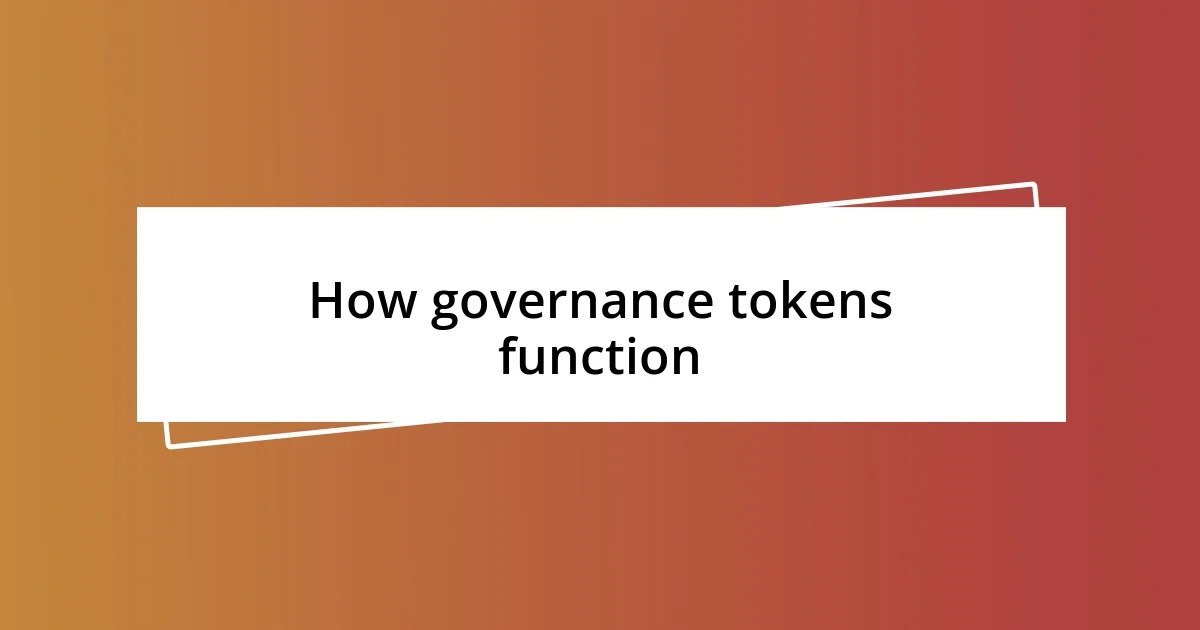
How governance tokens function
Governance tokens function as a bridge between users and the project’s decision-making process. Each token often equates to a vote, meaning that the more tokens you hold, the greater your influence. I still remember the thrill of having multiple tokens during a crucial vote. It felt empowering, almost like being part of a team where each member’s input could sway the outcome.
A significant aspect of how they operate involves the proposal mechanism. Community members can typically submit ideas for changes or improvements. When I think about my first experience proposing an idea, the blend of excitement and nervousness was palpable. Sharing my thoughts and seeing them turn into official proposals gave me a sense of ownership within the ecosystem. It’s fascinating how these tokens not only facilitate voting but also encourage creativity and innovation.
Moreover, governance tokens often have built-in systems to incentivize participation. Beyond voting, holders may receive rewards for being involved in discussions or for staking their tokens in governance. I once participated in a community forum where active members were rewarded with additional tokens for contributing valuable insights. This approach sparked my curiosity and drove deeper engagement, demonstrating how governance tokens can transform a static experience into a dynamic journey.
| Governance Token Feature | Description |
|---|---|
| Voting Rights | Each token usually equates to one vote, enhancing user’s influence on decisions. |
| Proposal Submission | Community members can suggest changes or upgrades, fostering creativity. |
| Incentives | Active participation often yields rewards, boosting engagement and commitment. |
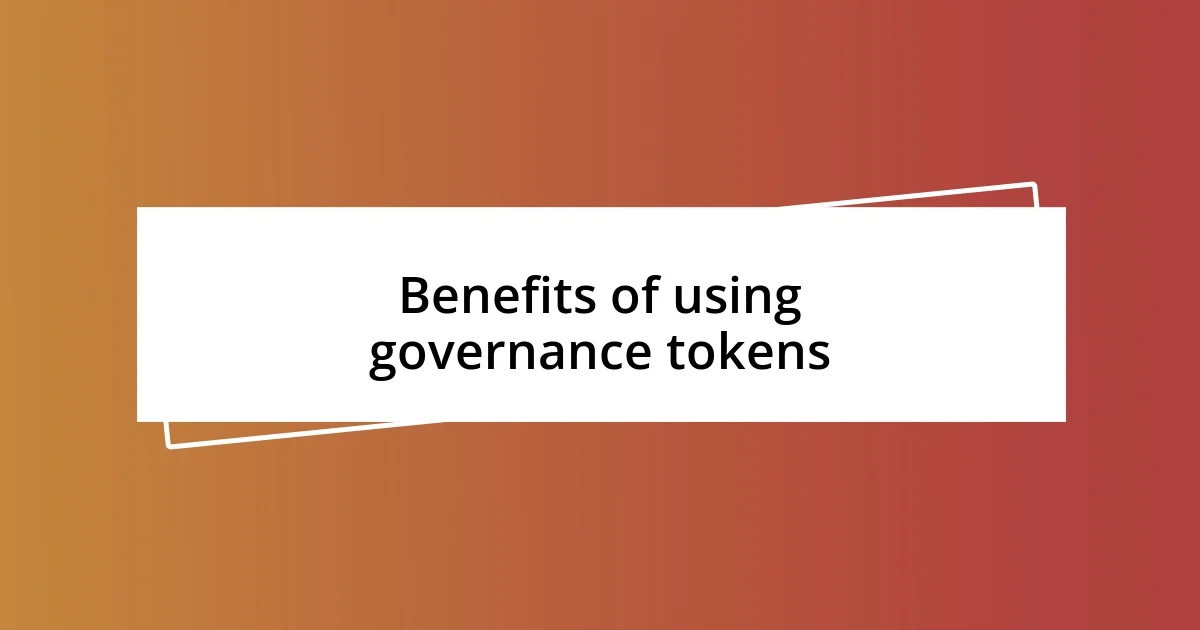
Benefits of using governance tokens
Governance tokens provide a direct channel for community members to express their opinions and preferences, creating a truly democratic atmosphere. I remember the excitement I felt during a community vote where every token mattered. It struck me how a single decision could reflect the collective will of our diverse group. Can you imagine the impact of such empowered voices driving a project forward?
One of the greatest benefits of governance tokens is their ability to forge stronger relationships among community members. I once engaged in a heated discussion about a proposed feature that divided opinions. The respectful debate that ensued not only deepened my understanding but also strengthened my bonds with fellow holders. It’s fascinating how these tokens facilitate not just governance, but lasting friendships and a sense of belonging.
Moreover, the structure of governance tokens often instills a sense of accountability within the project team. When I first voted against a proposal that I felt was misaligned with our community values, it was exhilarating to know my vote truly mattered. It made me realize that our collective decisions could steer the project in a direction that resonates with our shared vision. Isn’t it empowering to be part of something where your opinion genuinely influences the outcome?
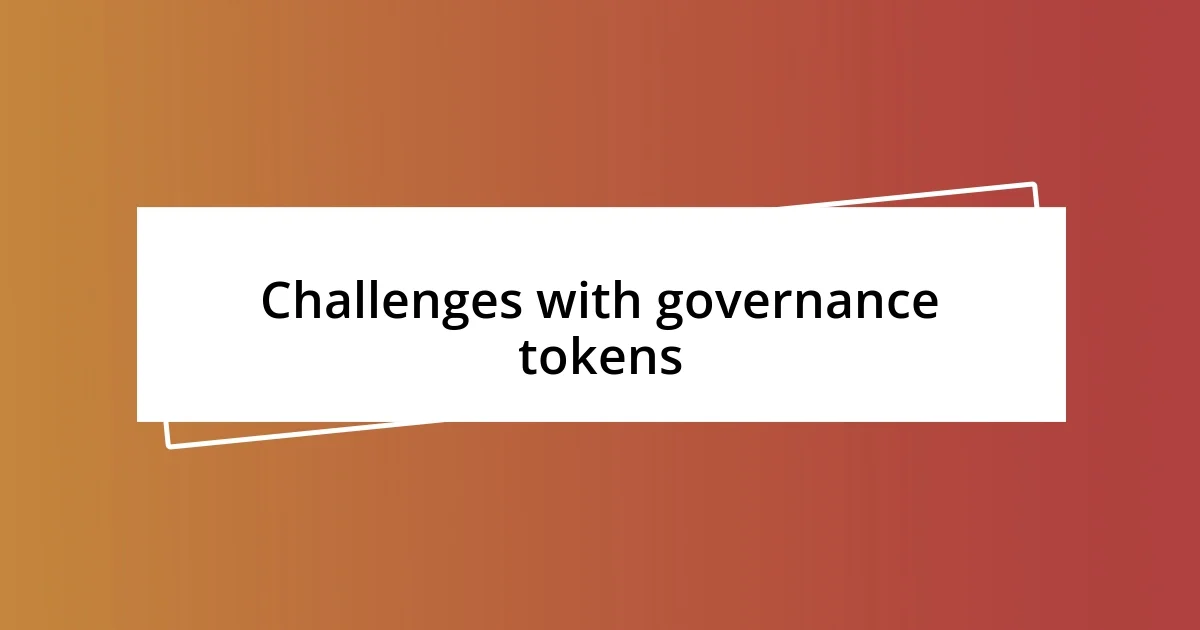
Challenges with governance tokens
Governance tokens come with their share of complexities. One significant challenge is voter apathy; many token holders might not participate actively in decision-making. I recall joining a vote that had a surprisingly low turnout, making me question the commitment of others. It’s tricky to build a vibrant community when so few voices are heard, right?
Another hurdle is the potential for whales, or large holders of tokens, to dominate the voting process. This concentration of power can lead to decisions that may not reflect the broader community’s interests. When I witnessed a major proposal passed mainly because of a single entity’s influence, I felt a mix of frustration and helplessness. How do we create a balance between beneficial leadership and democratic governance when a few can overshadow the many?
Lastly, governance tokens can create confusion around the lines of responsibility and accountability. Since decisions are often made collectively, it can become challenging to hold anyone accountable when things go awry. I remember a discussion about a failed project initiative where no one stepped up to take responsibility. It left me pondering: how can we ensure that individual contributions truly impact outcomes when the responsibility feels diffused among the crowd?
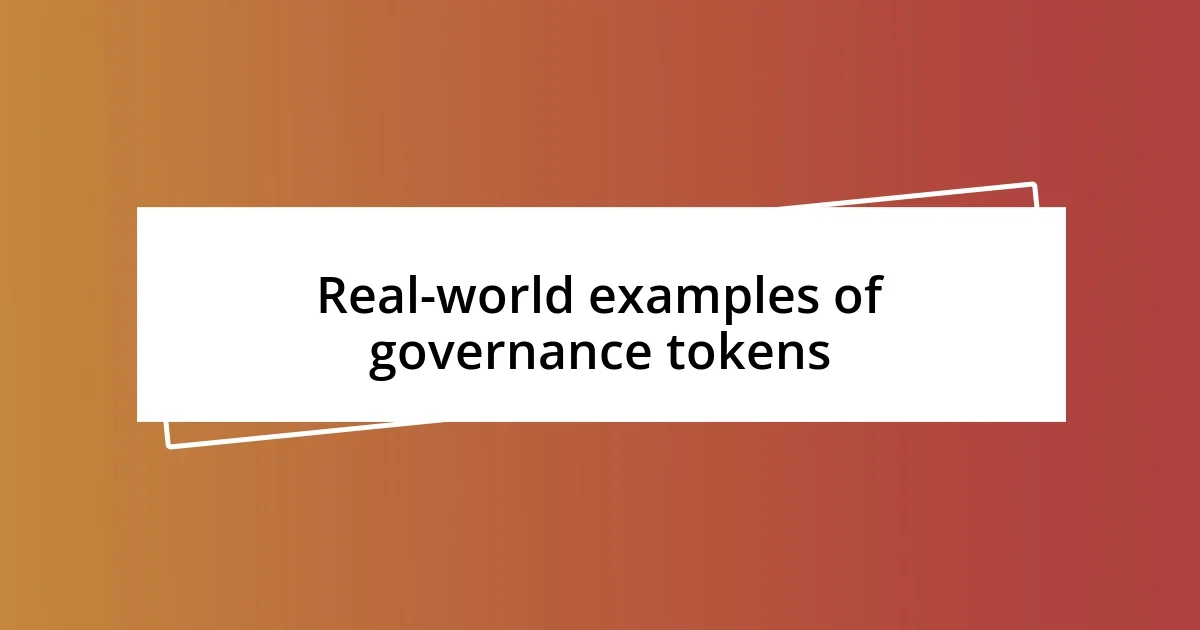
Real-world examples of governance tokens
Two notable examples of governance tokens in action can be found in the DeFi space. For instance, Uniswap’s UNI token allows members to vote on key protocol changes, including fee structures and liquidity parameters. I remember my first vote where we decided on a new liquidity pool; the sense of responsibility was palpable. It felt surreal to know that my input could genuinely shape the platform I actively engaged with.
Another interesting case is MakerDAO, which uses the MKR token for governance over the DAI stablecoin system. I vividly recall a tense voting round where we debated collateral types. The stakes felt high, and the diversity of opinions was invigorating. It made me appreciate how deeply interconnected our decisions were with the platform’s stability and success. Isn’t it compelling to think how these tokens convert discussions into impactful actions?
Additionally, look at AAVE, a decentralized lending protocol where governance is guided by the AAVE token. During a recent proposal to alter community incentives, I witnessed the robust dialogue and varied perspectives that ensued. It’s this kind of open discussion that makes governance tokens exciting, as they encourage a blend of innovation and accountability. Wouldn’t it be fascinating to see similar dynamics in other sectors outside the crypto realm?
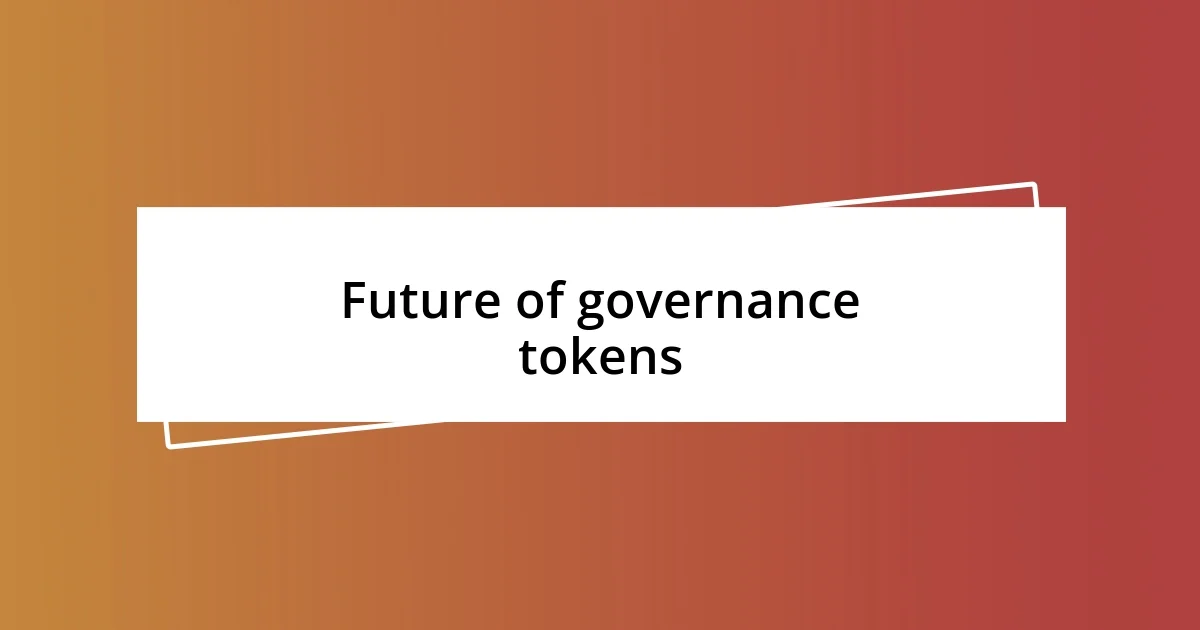
Future of governance tokens
The future of governance tokens is filled with potential, yet it hinges on addressing existing challenges. I often wonder how protocols will evolve to foster greater participation among token holders. If we can create incentives that genuinely engage the community, just imagine the vibrant discussions and decisions we could witness—wouldn’t that be exhilarating?
As these tokens mature, I see a promising trend toward enhancing transparency and reducing the influence of whales. I recall a brainstorming session where we discussed implementing quadratic voting to amplify the voices of smaller holders. This innovative approach could reshape how decisions are made, fostering a more equitable governance landscape. How many diverse perspectives could be recognized and valued in this new framework?
Moreover, I believe that the integration of advanced mechanisms, such as on-chain voting and automated governance systems, will play a pivotal role in the future. I remember feeling a wave of relief when I discovered a protocol using automation to simplify complex voting processes. With technology streamlining participation, I’m excited about the opportunities for more transparent and resilient governance. This could truly redefine community engagement—doesn’t that possibility spark your imagination?
